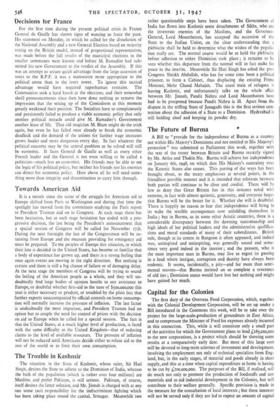Decisions for France
For the first time during the present political crisis in France General de Gaulle has shown signs of wanting to force the pace. His statement on Monday, in which he called for the dissolution of the National Assembly and a new General Election based on majority voting on the British model, instead of proportional representation, was made before the full results of the municipal elections in the smaller communes were known and before M. Ramadier had sub- mitted his new Government to the verdict of the Assembly. If this was an attempt to secure quick advantage from the large accession of votes to the R.P.F. it was a manoeuvre more appropriate to the political arena than to the ivory tower. To ignore this tactical advantage would have required superhuman restraint. The Communists took a hard knock at the elections, and their somewhat shrill pronouncements since then have done nothing to remove the impression that the setting up of the Cominform at this moment greatly weakened their position. The Socialists have so conspicuously and persistently failed to produce a viable economic policy that only another political miracle could give M. Ramadier's Government another lease of life. That old magician M. Blum might do the trick again, but even he has failed once already to break the economic deadlock and the demand of the unions for further wage increases grows louder and more dangerous every day. In fact whatever the political outcome may be the central problem to be solved will still be economic. It faces General de Gaulle as well as every other French leader and the General is not even willing to be called a politician—much less an economist. His friends may be able to see the logic of his political policy, but neither his friends nor his enemies can detect his economic policy. Here above all he will need some- thing more than integrity and determination to carry him through.


































 Previous page
Previous page